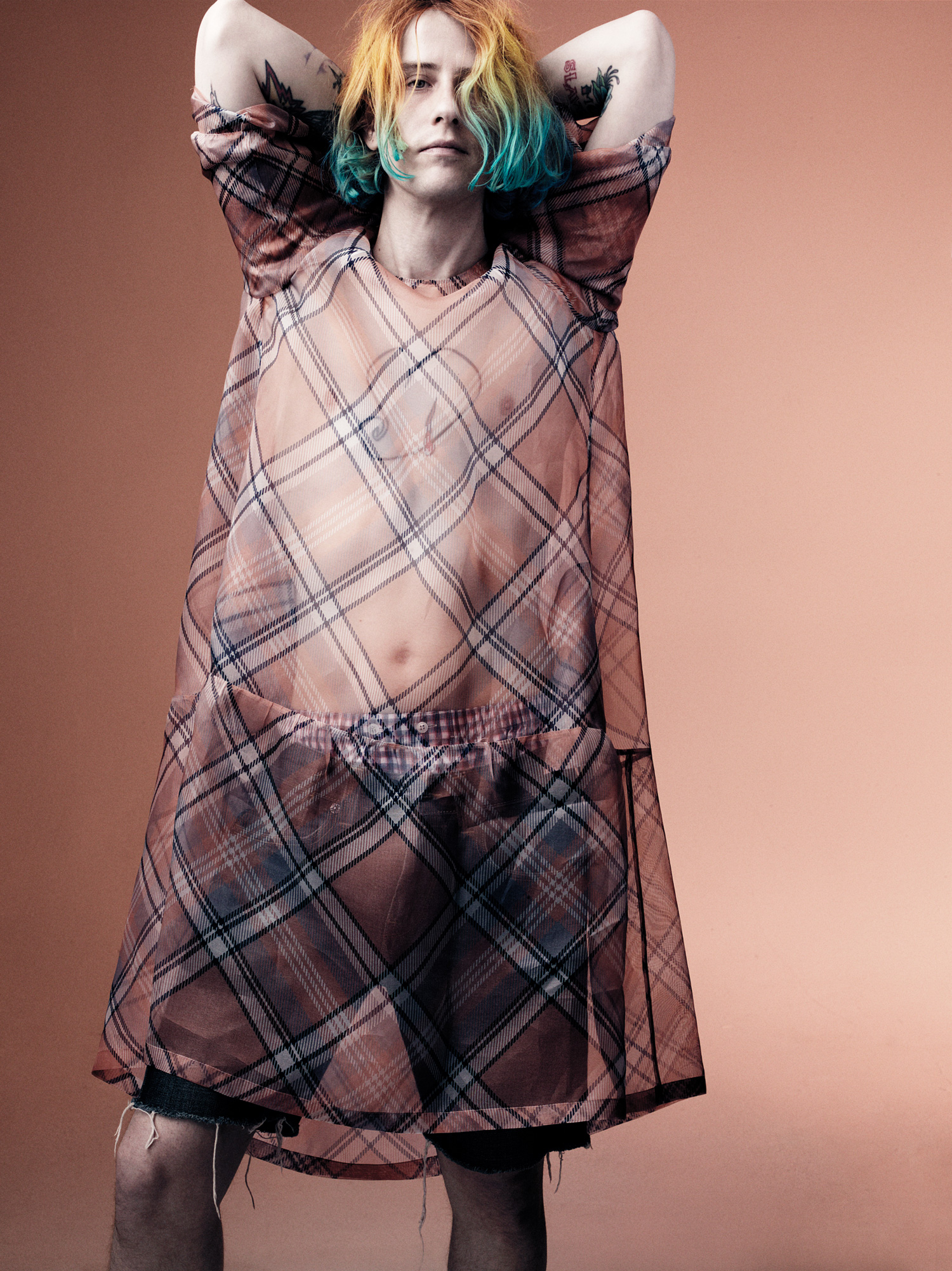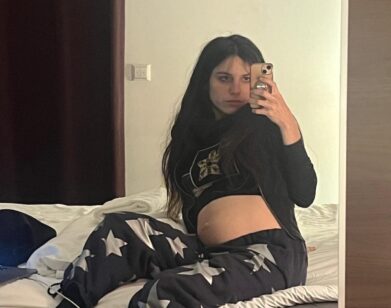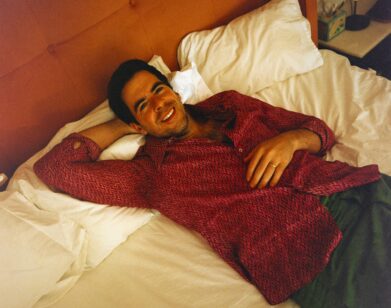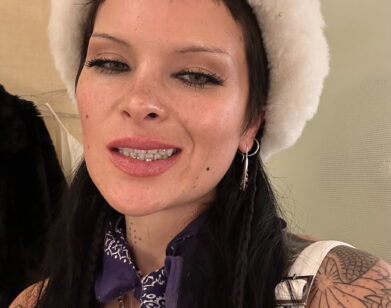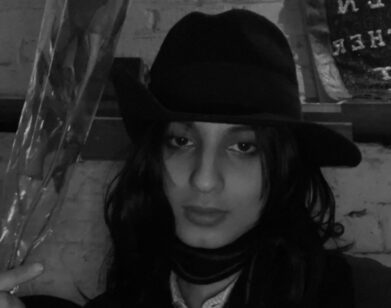Christopher Owens
I’m not going to go and join another cult but it’s true that there are certain things from that experience that are very valuable to me now. -Chris Owens
As front man for Girls, the San Francisco indie-rock band that he co-founded with bassist-producer JR White, Christopher Owens was on his way to becoming the pied piper of a new bohemian youth brigade. Girls’ 2009 debut, Album, and its artfully acclaimed 2011 follow-up, Father, Son, Holy Ghost, both teemed with a ’70s-rock revivalism that was as affectionately sincere as it was archly postmodern: Elvis Costello-style new wave collided with heavy, droning rock and confessional singer-songwritery lamentations—occasionally within the same song. Owens also quickly revealed himself to be a singer worth obsessing over, the kind of inscrutable, unedited, melodically inclined antihero to whom youth culture will forever cleave. (Fashion, of course, has an affinity for such figures, too, which might help explain Owens’s appearance in Hedi Slimane’s first campaign for Saint Laurent.)
Some of the mythical allure that surrounds Owens also has to do with his upbringing. Now 33, Owens spent much of his itinerant childhood traveling the world as a member of Children of God, the Christian sect now known as the Family International, which he ultimately left at the age of 16. He eventually wandered his way into the late-’90s hardcore punk scene in Amarillo, Texas, and was taken under the wing of Stanley Marsh 3, the controversial artist, philanthropist, and oil heir from Amarillo who helped create the large-scale sculptural installation “Cadillac Ranch.” (Marsh, who suffered a severely debilitating stroke in 2011, was arrested late last year and charged in connection with the alleged sexual abuse of several teenage boys; he was later released on bond, and the criminal case—as well as several civil cases related to similar allegations—are still pending.)
Seemingly riding high on the success of the well-received Father, Son, Holy Ghost, Owens, who arrived in San Francisco in the early 2000s and formed Girls with White in 2007, abruptly announced last summer in a series of tweets that he was quitting the band. “This may come as a surprise to many & has been an issue of much thought for me,” he wrote. “My decision was not easy to make. I am leaving Girls. My reasons at this time are personal. I need to do this in order to progress. I will continue to write & record music.” The first of that music is Owens’s premiere solo album, Lysandre (Fat Possum), a sprawling, ambitious, and tapestry-like concept album centered on a fleeting affair that Owens had with a French woman whom he met while playing a music festival, as well as the budding music career that brought him there. Even before its release, Lysandre felt like an event: Ryan McGinley shot the album’s cover art and L.A.-based filmmaking duo Focus Creeps signed on to make a documentary of the tour.
Jason Pierce—better known as J. Spaceman, leader of the psychedelically cosmic rock bands Spacemen 3 and Spiritualized—recently spoke with Owens, who was at home in San Francisco. Pierce had just returned to London from Japan, where he was touring with Spiritualized, and Owens was fresh off the road from Europe, where he had been showcasing Lysandre live in advance of the album’s release in January. They were joined on the phone by Interview contributing music editor Matt Diehl.
J. SPACEMAN: This is a weird way to meet.
CHRISTOPHER OWENS: Yeah, I found out about an hour ago.
SPACEMAN: That you’re doing this interview? I found out yesterday. It’s an interesting thing to get to know in advance . . . I think I would have liked to have found out an hour ago. [Owens laughs] So what are we doing?
MATT DIEHL: Well, I was thinking you guys might talk about stuff you have in common.
SPACEMAN: Am I doing the interview here?
DIEHL: I can ask some questions if you’d like, but I think you should start.
SPACEMAN: Well, in that case, I think I’d like some music while we talk, since I’m doing your job for you.
DIEHL: [laughs] How about Christopher’s new record? That feels like a good place to start.
SPACEMAN: I do want to talk about this record. It’s such a big record—and a beautiful one at that. Obviously, one of the first things you think about when you hear it is this girl who is at the center of it. So tell me: Did you stay close with her after you broke up? How did she feel about you making this thing about her?
OWENS: We stayed really close friends. She went through a lot, which I appreciate, and I didn’t want it to be awkward. It’s strange, though, because I’d fallen in love with the music so much. . .
SPACEMAN: If she hadn’t liked it, would you have still released it?
OWENS: Yeah. Maybe I would’ve changed the title or something, but it’s definitely best presented this way, so it’s a good thing that she’s okay with it. I talked to her before doing it, and made sure she was okay with the idea of it all. She’d heard a few of the songs and was actually pretty excited to hear it finished, as a whole.
SPACEMAN: It’s interesting because when you listen to Ray Charles, you don’t think about who he sang a song about—you relate it to your own life. But your songs are weird in the sense that I really do relate what you’re singing about to you and that girl specifically.
OWENS: Well, I feel like you have to be able to relate it to something that other people have experienced, too, and not make it too specific. But there’s a certain amount of storytelling with this album, and I felt like I had to make it quite specific to the person and to what actually happened.
I was going to move to San Francisco and have some liberating coming-outmoment with my new self in a discotheque, but that never happened.-Chris Owens
SPACEMAN: The other thing that Lysandre reminds me of is Serge Gainsbourg’s Histoire de Melody Nelson [1971]. That album is quite like a novel, and your record is like that, too.
OWENS: What’s different to me is that Melody Nelson was turned into a movie soundtrack, which is one of the reasons why it became so big. But my album can’t go along with a movie, so everything has to be in the song—as a result, it’s a little bit more detailed. The theme was a bit of music that I wrote just after hanging around with her. That was pretty much the only part I wrote while the relationship was still going on. It’s just a short little melody, but it’s something I just sentimentally associated with her.
SPACEMAN: It’s almost like it’s not your song—like it’s her song in a way. Were there any things in particular that influenced how you went about making the album?
OWENS: It’s a bit all over the place. Musically, I was actually very influenced by Nico’s Chelsea Girl [1967] album—not lyrically at all, but just in the way that there’s classical guitar and flute all over it. Donovan was also a bit of an influence, too, musically. Lyrically, there’s an epilogue at the end of the album that’s very influenced by Bob Dylan.
SPACEMAN: I detected a bit of a Modern Lovers influence in there as well—like Jonathan Richman—in the way you tell stories about the small things in life. There’s been this big sweep of your life, being raised in the cult and going through everything you’ve gone through. But then you’ve written a whole record about this small part of it, this relationship that didn’t quite happen, honing in on this tiny bit of your world that didn’t work out. I think there’s something magical about that. It seems like the affair didn’t even last a year, did it?
OWENS: No, it didn’t really—it was very short. To me, there are a lot of other things that were important in making me want to write about that time period. Getting comfortable just performing my songs for the first time in front of people coincides with this love story. There are a couple songs about really doubting myself.
DIEHL: There are some strikingly honest moments on Lysandre, like when you wonder aloud, “What if I’m just a bad songwriter?” on the song “Love Is in the Ear of the Listener.”
OWENS: That was written about playing my first festival show. It’s about stage fright.
SPACEMAN: Did that feeling ever change for you? How do you feel about playing in front of people now?
OWENS: I feel kind of the same. It’s something that hasn’t really gone away, which is why I wanted to write about it. You can get into confident strides, periods where you feel a bit better about it all, but there are really a lot of times where you find yourself wondering if what you’re doing is important. People get to you—you know, critics and the press.
SPACEMAN: That’s the thing, isn’t it? When you write a song, if you play it just for one person—even if it’s someone from your band—it’s still kind of hard to take. I’ve been doing this most of my life and I can still barely look at the audience. [both laugh]
OWENS: The album is just about how tender that time was. When you’ve lived through something significant, it can carry enough meaning to explain all the larger things that are impossible to get a handle on. To me, this very small story helped me understand life in a better way. If you pay attention to these little moments that are meaningful, it’s a way to sort of “get” your life, if that makes any sense.
SPACEMAN: It does. So how are you going to tour behind Lysandre?
OWENS: We’ve already done a few shows. But it’s a performance of the album. I’ve also been playing some covers that reflect some of the influences that went into making it. I got lucky—for the first time, all of the people who are on the album with me are willing to go on tour.
SPACEMAN: I know there are two girls on the record. Does that mean that they’re on the tour as well?
OWENS: Yeah, there are two girls. One of them is actually my girlfriend, and the other one is her very good friend from college.
SPACEMAN: How’s that, having your girlfriend sing love songs about another girl?
OWENS: [laughs] She’s a very understanding person. She has a lot of respect for what I do, what kind of person I am, and that I wrote these songs about what happened in my life. But really, it’s just exciting to go on the road with your girlfriend—it’s not an opportunity you get very often.
SPACEMAN: I’ve got all your records and I really enjoy them—they’re just crammed with good stuff. That one song by Girls, “Vomit” [off Father, Son, Holy Ghost], is such a heartfelt tune.
OWENS: There’s a bit of a Bible verse in there: “As a dog returns to his vomit, so a fool returns to his folly.” That song is about not being able to walk away from an obsessive, codependent relationship, and returning again to this thing that you know is bad for you.
SPACEMAN: Do you believe in God?
OWENS: No, I don’t. Never have, really. I was raised very, very religiously, and very one-sidedly Christian. It was a huge part of my life, but also something I knew I never believed in. Still, little things that you were raised with, they don’t just go away. I was always rebellious about everything I was taught in a religious sense, but every once in a while, you write a song like “Vomit” and somehow end up titling it from some Bible verse you remember.
SPACEMAN: I learned a bit about Children of God from watching the documentary [Children of God: Lost and Found, 2007]. It was weird watching it because, to me, it doesn’t seem much different from any other religion. There are a lot of outrageous things in the Catholic church—or any church, really. I always thought that religion was a bit dated in America. I find myself going, “Is that what you think?”
OWENS: To me, it’s crazy that people believe in that stuff, so I guess you have to try and understand that everybody’s different.
SPACEMAN: There’s not a map. But I understand that there were a number of kids in that thing that you were in who committed suicide. Did that ever come into your life at all?
OWENS: I mean, to be honest, I have thought about it, but it’s something I’ve always known I would never succumb to, something I knew I didn’t want to do, you know? But there are a lot of kids I grew up around who have done that, and I understand why. A lot of times it can feel like a way to make a great statement or something. But I feel lucky to have found something to live for. Like, I want to stay around and record the rest of my music. I feel like that’s very valuable. But, yeah, it’s just a really weird thing to have happening around you—a very negative sort of thing to be so aware of.
When you’ve lived through something significant, it can carry enoughmeaning to explain all the larger things that are impossible to get ahandle on.-Chris Owens
SPACEMAN: Was it difficult to leave Children of God?
OWENS: It was pretty difficult. I’d wanted to leave from such a young age that I got put into all these rigorous, awful programs to rehabilitate my feelings and encourage me to stay. By the time I turned 16, in 1996, I had an older sister who had left and had a place where I could actually go; and when I made it very clear that I wasn’t going to change my mind, then I was given total freedom to leave. I was living in Slovenia, when the war in nearby Bosnia was barely over. I had to actually travel to Italy and Austria, where people had money, and busk to pay for my own airfare. I had to raise $500 by singing on the street to travel back to America. I’d worked up a little batch of some secular popular songs—a lot of them I’m covering now in my show, like Cat Stevens’s “Wild World” and “The Boxer” by Simon & Garfunkel.
SPACEMAN: I can’t imagine what it must have been like to be inside that big family—but it’s not your real family.
OWENS: It does feel like a family, but my dad left it before I was even born, and my mom left after I did. There was a 10-year period of my life where the idea of family didn’t even exist. We were trying to be normal people, but it’s obvious at every turn that we didn’t have the connection a regular family has—that something was done to me.
SPACEMAN: Another interesting thing I noticed watching that Children of God documentary is that they seemed to be listening to some of the coolest music I’d ever heard. [laughs]
OWENS: I did love a lot of the music I grew up with. Only recently have I been able to appreciate it, because I spent my teenage years rebelling against it so much. It’s tricky because you end up hating that part of your life, but there are really a lot of amazing, special things that you can find yourself looking for again. I’m not going to go and join another cult, but it’s true that there are certain things from that experience that are very valuable to me now.
DIEHL: In a way, Girls seemed like an attempt to put together another kind of family unit. Would you say that’s true?
OWENS: It really was. Every little gang that I’ve been in since moving out as a teenager—the punk scene in Amarillo, Texas, where I first lived after leaving Children of God, and later when I went to work with Stanley Marsh and that group of artists—has very much been like a family. Then when I got to San Francisco, the scene that all the Girls material was from, that became my family.
SPACEMAN: Why did you choose to go to San Francisco?
OWENS: I wanted to move to a major city because Amarillo was an awful place to live. I was put in jail a few times. I had friends who were beaten up and killed . . . It’s a long story, but Amarillo was just an extremely conservative little bubble to live in. I found wonderful people there and had good experiences, but I wanted to leave for a long time. So once I saved up enough money, I started looking at where I would live. New York and L.A. didn’t really appeal to me too much for different reasons—New York just seemed too big, and L.A. seemed too spread out. But San Francisco seemed to have the right consistency. My teenage years were spent in Europe, so San Francisco had a certain nostalgic feel to me. It’s somewhat European in a way—it’s a bit of a small town, but at the same time, it’s a sophisticated metropolis. I just drove up here to try it out, and I’ve stayed now for seven years. It has become very much my home. I’d also had more boyfriends than girlfriends up to the point when I moved here. I’d heard about San Francisco’s large gay community, and was curious to see whether I’d fit in there. Of course, I got here and immediately had a girlfriend. [laughs] I was going to move to San Francisco and have some liberating coming-out moment with my new self in a discotheque, but that never happened.
DIEHL: Were you surprised that success came fairly quickly for you and Girls?
OWENS: I was very surprised by how fast everything went, but that’s just the way the world works now. It felt a lot of times like something else was pulling you along, something bigger than yourself. The fans themselves gave it so much momentum. They found Girls before there was even really a band in place.
DIEHL: I think a lot of them had this fantasy that Girls was this sort of roving, beautiful communal society.
OWENS: I think I thought the same thing.
DIEHL: Was it difficult to walk away from that?
OWENS: It’s always difficult, but if you know in your heart what you’re supposed to do, then it shouldn’t really matter. You should do it anyway . . . Everything’s just very different now. It’s valuable to be able to present other sides of yourself; if you can do that successfully, then over time people will understand that there’s maybe more to you.
DIEHL: How does being on your own, as opposed to being in a band, manifest itself in the music? Do you go about writing differently?
OWENS: For me, it’s always the same process. I’m still writing songs in the exact same way I always have. I always write them alone, so that hasn’t changed.
SPACEMAN: I think the writing part is even easier when you’re on your own. When you write with somebody, you’re compromising your ideas, which is not the same as finding your own way to make something better. But, for me, the biggest thing about being in a band is confidence. I have no self-confidence—even now—but a band is like a gang. You’re all in it together.
OWENS: I very much wanted a band, but it had to be a real band, where each member is very important. The problem with Girls was there wasn’t really a band that ended up contributing, and that’s why it fell apart. Over time, it just became clear that I did want to keep the ideas the same as the way they were written. It was a lot easier recording this time around, to be the only person saying, “This is how it’s going to go,” or, “This is how things are going to sound.”
SPACEMAN: When you make a record, it’s not about that three and a half minutes you capture in the studio. It’s all the time around that, when you’re trying to get your life into this tiny little piece.
OWENS: I think about it like being a writer. You have an opportunity to share your feelings and perspective with other people. Things that happen in the future are going to affect very much what I’m doing next. That’s kind of the whole point for me: to open up a window to what my experience is.

